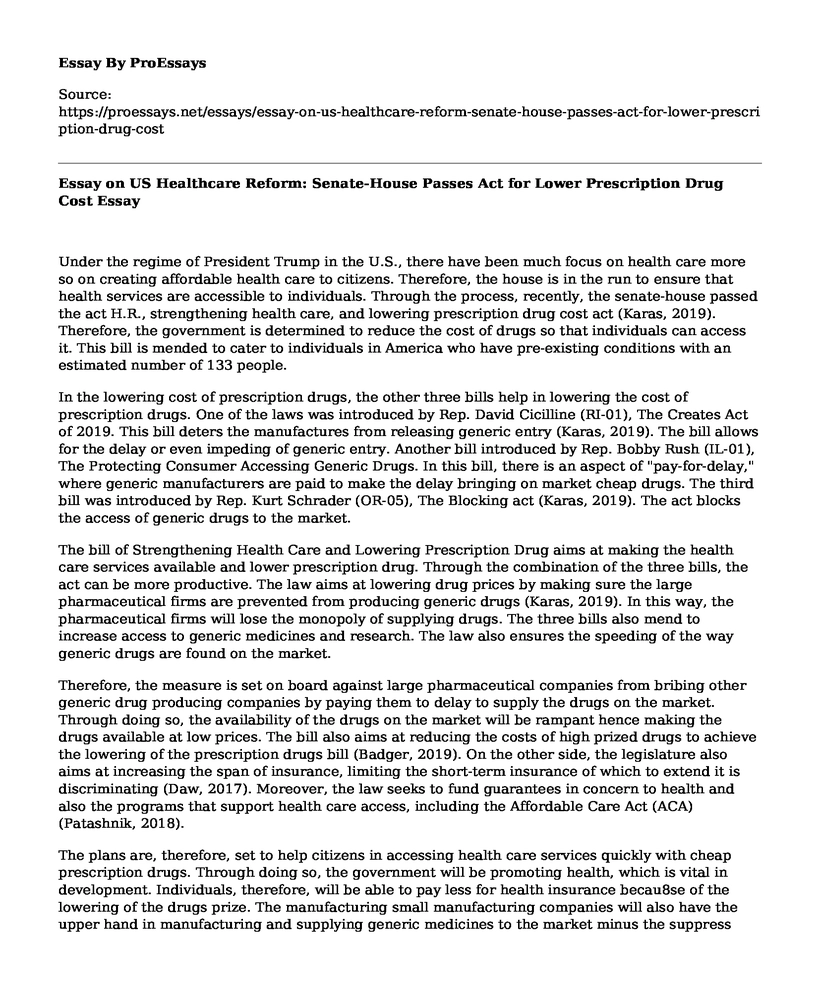Under the regime of President Trump in the U.S., there have been much focus on health care more so on creating affordable health care to citizens. Therefore, the house is in the run to ensure that health services are accessible to individuals. Through the process, recently, the senate-house passed the act H.R., strengthening health care, and lowering prescription drug cost act (Karas, 2019). Therefore, the government is determined to reduce the cost of drugs so that individuals can access it. This bill is mended to cater to individuals in America who have pre-existing conditions with an estimated number of 133 people.
In the lowering cost of prescription drugs, the other three bills help in lowering the cost of prescription drugs. One of the laws was introduced by Rep. David Cicilline (RI-01), The Creates Act of 2019. This bill deters the manufactures from releasing generic entry (Karas, 2019). The bill allows for the delay or even impeding of generic entry. Another bill introduced by Rep. Bobby Rush (IL-01), The Protecting Consumer Accessing Generic Drugs. In this bill, there is an aspect of "pay-for-delay," where generic manufacturers are paid to make the delay bringing on market cheap drugs. The third bill was introduced by Rep. Kurt Schrader (OR-05), The Blocking act (Karas, 2019). The act blocks the access of generic drugs to the market.
The bill of Strengthening Health Care and Lowering Prescription Drug aims at making the health care services available and lower prescription drug. Through the combination of the three bills, the act can be more productive. The law aims at lowering drug prices by making sure the large pharmaceutical firms are prevented from producing generic drugs (Karas, 2019). In this way, the pharmaceutical firms will lose the monopoly of supplying drugs. The three bills also mend to increase access to generic medicines and research. The law also ensures the speeding of the way generic drugs are found on the market.
Therefore, the measure is set on board against large pharmaceutical companies from bribing other generic drug producing companies by paying them to delay to supply the drugs on the market. Through doing so, the availability of the drugs on the market will be rampant hence making the drugs available at low prices. The bill also aims at reducing the costs of high prized drugs to achieve the lowering of the prescription drugs bill (Badger, 2019). On the other side, the legislature also aims at increasing the span of insurance, limiting the short-term insurance of which to extend it is discriminating (Daw, 2017). Moreover, the law seeks to fund guarantees in concern to health and also the programs that support health care access, including the Affordable Care Act (ACA) (Patashnik, 2018).
The plans are, therefore, set to help citizens in accessing health care services quickly with cheap prescription drugs. Through doing so, the government will be promoting health, which is vital in development. Individuals, therefore, will be able to pay less for health insurance becau8se of the lowering of the drugs prize. The manufacturing small manufacturing companies will also have the upper hand in manufacturing and supplying generic medicines to the market minus the suppress from the major drug manufacturing companies (Badger, 2019). This highly depreciates the value of the generic drugs on the market due to the availability opposed to the trick that was being used by the sizeable generic drug manufacturing companies paying small companies to delay the supply hence increasing the demand that results in high prices.
References
Badger, D. (2019). Congressional Proposals to Increase Federal Health Care Spending: A Flawed Approach, Building on Failure.
Daw, J. R., & Sommers, B. D. (2017). Immigration, pregnancy, and health insurance: New Evidence and Ongoing Debate.
Karas, L., Anderson, G. F., & Feldman, R. (2019). Pharmaceutical 'pay-for-Delay' Reexamined: A Dwindling Practice or a Persistent Problem?. Hastings Law Journal, Forthcoming.
Patashnik, E. M., & Oberlandre, J. (2018). After defeat: converting post-enactment opposition to the ACA in a historical-institutional perspective. Journal of Health Politics, Policy, and Law, 43(4), 651-682.
Cite this page
Essay on US Healthcare Reform: Senate-House Passes Act for Lower Prescription Drug Cost. (2023, Feb 23). Retrieved from https://proessays.net/essays/essay-on-us-healthcare-reform-senate-house-passes-act-for-lower-prescription-drug-cost
If you are the original author of this essay and no longer wish to have it published on the ProEssays website, please click below to request its removal:
- High Levels of Curative Health Expenditures
- Syllabus Course on the Introduction to Fields of Addiction Review Paper
- Essay Example on God Bless the Child: US Response to Juvenile Prostitution
- Essay Sample on Correction System: Ensuring Security of Society Through Jails & Agencies
- Paper Sample on Eli Lilly: A Case Study on Changes in Pharmaceutical Industry
- Free Paper Sample: US Healthcare System: Access, Rights & Changes
- Report Sample on Effects of Coronavirus on Pets







